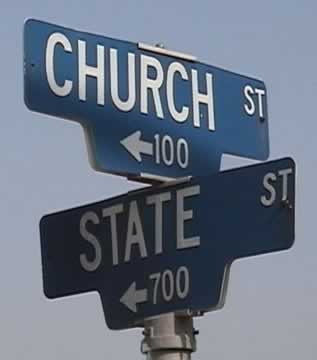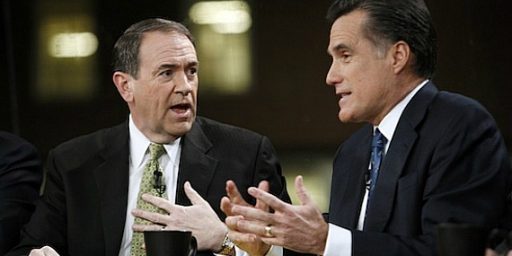Religious Tests
 Christopher Hitchens praises the Constitution’s prohibition on religious tests for public office, along with the right to worship as one pleases. But he wishes to be precise:
Christopher Hitchens praises the Constitution’s prohibition on religious tests for public office, along with the right to worship as one pleases. But he wishes to be precise:
However, what Article VI does not do, and was never intended to do, is deny me the right to say, as loudly as I may choose, that I will on no account vote for a smirking hick like Mike Huckabee, who is an unusually stupid primate but who does not have the elementary intelligence to recognize the fact that this is what he is. My right to say and believe that is already guaranteed to me by the First Amendment. And the right of Huckabee to win the election and fill the White House with morons like himself is unaffected by my expression of an opinion.
He goes on to list several hypothetical (or not-so-hypothetical) candidates whom he would reject out of hand, including Scientologists, Mormons, and members of extremist factions.
The above list is not exhaustive. But, in merely saying that an adherent of any such belief would certainly influence my vote and also be sure to sway it negatively, I myself apply no “religious test.” To do that, I would have to be a legislator or policeman who was urging or upholding an alteration in the law of the land. And, as previously noticed, I would have to demand, and get, an amendment to the Constitution in order to bring this about. To put this simply enough, if I turn to a JDL fanatic and tell him that I will not cast my vote for him, and he responds by saying that I am deciding my vote on the unfair basis that he is a Jew, he is welcome to the meager consolation that this may afford him, but he is legally entitled—as am I—to fight another day.
That’s quite right. Atheists are free to not only vote against but vigorously campaign against religiously devout candidates, Christians are free to oppose Jews, and Baptists are free to refuse to vote for Methodists.
The reverse is also true, however.
Evangelical Christians are free to decide for whom to vote solely on the basis of a candidate’s commitment to Jesus Christ. Religious folks are free to be single issue voters on abortion or school prayer. They’re free to vote for candidates for school boards who will work to promote “abstinence only” teaching and keep books promoting tolerance for homosexuals off the curriculum.
Once in office, religious minded politicians can seek to enact these policies into law. So long as there is a secular purpose, a religious motivation is almost never an obstacle.
The application of Hitchens’ principles will doubtless make it more difficult for men like Mike Huckabee or Mitt Romney to get elected president, because their creeds are outside the American mainstream. But, as has been noted here numerous times, Americans are more than twice as likely to elect a Mormon as an atheist. Expression of religiosity, preferably an ecumenical Christianity, remains a decided plus for political candidates. That’s not a religious test; it’s just democracy.
Photo credit: Jill Stanek via Google Images.
Correction: Added a sentence to original for clarity.






>So long as there is a secular purpose, a >religious motivation is almost never an >obstacle.
I would go a step further…there need not even be a secular purpose! If one wants to vote for Mike Huckabee because one believes he will usher in the Second Coming, then that’s your right. I would agree that its not in the spirit of the First Amendment, but the First Amendment binds only the government, not the individual voter.
Huckabee’s not in the mainstream? I think he is…evangelicals and fundamentalists are, what, about 20% of the population, isn’t that sufficiently mainstream? They’re certainly pretty common in the South, as you well know!
I was running two thoughts together; I’ve clarified my meaning in the post. Yes, voters can have whatever motive they want in mind. It’s policymakers who have to have a secular purpose when enacting these preferences into law.
Well, people who are nominally members of those faiths are probably 20 percent. People who actually believe with Huckabee’s fervor are much less common.
Yeah, I posted to the same effect after Lawrence O’Donnell’s anti-Mormon rants.
The constitutional requirements for the presidency are pretty limited—age and native-born status. Everything else is purely personal preference and the reasons can be as benign or nasty as human beings themselves are.
Hitchens can’t vote. They don’t allow open liquor at polling places.
If that’s the case, then we need to amend the Constitution. Are you with me, floyd?
Well, as much as I may agree with his principle, It’s quite pleasing to think that Hitch is utterly unelectable for pretty much any conceivable office.
As an atheist, I disagree with Hitchens that certain faiths would automatically disqualify someone from public office. I do roll my eyes a bit when candidates try to play up their religious ‘credentials’: it seems to say hardly anything about the candidate – some really good and some really bad politicians have been religious – but it’s not going to decide my vote.
Huckabee’s religiosity doesn’t particularly offend me. Even if I disagree with him theologically, it’s a breath of fresh air to have a candidate who seems to honestly believe in his religion. On the other hand, specific sub-beliefs are substantial factors: it DOES effect my vote that Huckabee believes in young earth Creationism. First, if he wants to teach it in science classrooms that impacts me by damaging the economic prospects of the US overall in high tech jobs that involve science. Second, it suggests he doesn’t look at evidence or consult experts, but just reaches the conclusions he wants to reach. As a symptom of a broader mindset, that belief is very troubling vis-a-vis his success as CIC.
The thing that most deeply frustrates me is people like Romney who suggest you can’t have freedom or be a decent person without a strong dose of religiosity. That does offend me.
Daniel;
Do really think archeology is that relevant to high tech competition? Or do you think that a single error renders all science wrong?
Creationism was not only taught, but considered a “given”, when our fathers went to school and their schools produced arguably the most scientifically advanced and economical competitive generation in our history because of [or spite of]it.
Separate subject….
Far be it from me to speak for Gov. Romney, but I think he may be saying that religion is essential for a NATION to have freedom, not an INDIVIDUAL.
Herein lies the logic.
Without recognition of a higher power by the state, there is no source for rights.
Rights and principle then become endowed by the state, and therefore subject to change at the whim of the state and therefore not inalienable.
Now, I don’t expect you to agree with this logic,only to understand that this position is no threat to you, since the position endows both believers and non-believers alike with the same rights in the eyes of the holder.
Evolutionary theory and natural selection are at the foundation of modern biology. I don’t think you can just omit them and not have it have some effect on the quality of high tech fields such as microbiology, genetics, etc.
Wrong? No. Highly suspect, and forever subject to second-guessing? Absolutely. If it became the “law of the land” that young-earth creationism must be taught in US schools with the same (or greater) credence as evolutionary biology, it would turn our entire educational system into a global laughing-stock. If biblical literalism is allowed to subvert biological and archaeological observation, then what would keep it out of physics? Chemistry? Medicine? What value then would an “American education” have on the global market? Zilch.
In short, it’s not that Huckabee is a devout believer that renders him unfit for office – it’s what he believes.
“Without recognition of a higher power by the state, there is no source for rights”
I.e. – the only solid grounding for our rights is to derive them from a fantasy?
“Rights and principle then become endowed by the state, and therefore subject to change at the whim of the state and therefore not inalienable.”
The Constitution is not the state. It is the set of principles under which the state is established.
And yes, the Constitution is subject to interpretation and amendment, making our rights “alieanble” but that is true whether we claim they derive from a higher power or not.
How can anyone believe that our rights are somehow more protected because we claim, rhetorically, that they derive from a higher power? In the real world, the rights are either upheld or violated without any intervention by those supposed higher powers.
Arguing in a court, or in a legislature, that some percieved violation of rights is against the endowment from a higher power will not get you very far – certainly no farther than arguing that the issue is a violation of core Constitutional principles.
Because absent deity, what higher power is there, than government… and what, in that context, other than government, has sufficient power to take those rights away?
And Tano, since you seem about trying to dis some quotes, try this one:
Tano;
I was explaining the rationale of people who, believe it or not are at least as intelligent as you are and have somehow , to your confounded consternation, come to a different conclusion.
In my view, the correct one.
It was not my intention to merely ring your Pavlovian bell.
NoZe;
Pure unadulterated NoNsense!
Legion;
Your Irrational fears,as stated in your second paragraph,are simply unfounded, and not rooted in mature logic.
The point of the comment, obvious to the literate,is clearly stated in my last sentence.
I certainly was not trying to explain once again the concept of time to those whose comprehension is limited to clockwork.
Sincere aversion on your part, or sincere averring on mine, will not change the fact that God is.
floyd,
I have no doubt that those who have reached an opposite conclusion than I did, are far more intellegent than I am. My pavlovian response was merely an attempt to roll our my feeble argument so that all my betters could, with kindness and grace, point out to me where I have gone astray.
Bithead,
“Because absent deity, what higher power is there, than government… ”
None.
Should we just invent one then, because to have one would be convenient for the logical path that you are on?
I tried to make the point that the Constitution, although not a “power”, is something that is higher than government. The government is established by the Constitution. The Constitution represents the principles that transcend the operation of the government.
“what, in that context, other than government, has sufficient power to take those rights away?”
I am not sure where you are going with this. I repeat the question that I asked before. How does asserting the existance of a higher power, a diety, add any protection to our rights in face of a tyrannical government? Were we to face such a thing (like one that tried to take away habeus rights for instance), the only recourse we have is to the the mechanisms under the Constitution, or to revolution.
Do you believe that God would intervene to save us from tyranny? If not, then please explain – what does this rhetorical grounding of our rights in a higher power actually mean in the real world?
What difference does it make to any struggle to maintain our rights?
As for the quote – may I be allowed to disagree with Mr. Adams?
No, what the founders were about when they wrote that all men are endowed right by their creator, was acknoledging what already was there, in their view. Since the right were provided by that higher power, they were aand are inalienable. Should we so lightly disregard their construct for the sake of atheism?
Like it or not, our culture is, even for the unbeleiver, steeped in the Judeo-Christian ethos.
Of course. But I’d not advise it.
Oh c’mon Bit, I bet we could find a few things that Mr. Adams said that you might take exception to!
As for the grounding of our rights – it should be noted that these phrases appear in the Declaration – the document meant to serve as our escape from British rule. They do not appear in the Constitution. There we find the attitude that the grounding of a government, with limited powers, guaranteeing rights, is an a work of “we the people”.
We the people establish certain principles, enshrine them in a Constitution, and thereby protect our liberty. There is no other protection, except violent resistance, if that ever be necessary.
Once again, you dont answer my simple question. What does a rhetorical grounding of our rights in an endowment from a higher force, add to any practical protection of those rights?
Given that the English monarchy claimed a divine right to authority, maybe the phrase in the Declaration was simply an argumentative ploy to claim equal or greater legitimacy for our revolution. A rhetorical nicety, that had no practical effect – our rights vis a vis the monarch could only be secured on the battlefield.
In total? Doubtless.
In terms of the constitution? Not a chance.
You see, on that subject, Adams was speaking as a designer, and speaking specifically of design requirements. I make the assumption that the person who was in on the ground floor of the design, probably has a distinct informational advantage on the topic, just as someone who designs a building or a plane or a boat or whatever has an informational advantage on what THEY were a part of building.
Let’s makre sure about this… You’re saying the DOI is never used as a basis of determining fouder intent? Be careful, here.
Actually, we do nothing of the sort. I don’t suppose you’ve noticed the trend, Tano, wherein as we move away from there being a power higher than man and his constructs (One of them being government, of course) that those rights are being slowly and relentlessly eroded?
OK, try this old line on for size: Government by consent of the governed.
That’s certainly one of the principles this country was founded on – what with getting out from under King George’s tyranny – and I would go so far as to say that it is a (arguably the) defining concept of a free society. For if the people have no real say in their government – who runs it, what it does, etc – then they are no longer citizens, but merely subjects, in the basest sense of the word.
Unfortunately, this concept plays poorly with those who would inject far more religion – invariably their own personal brand – into government. God is, or is not, whether or not the people approve. Involving any sort of religious test for office is incredibly dangerous. What a person’s character is is important, but not necessarily where that character comes from – a decent, upstanding atheist (or Satanist, or Buddhist, or whatever) is far better than a lunatic or vile creep who can explain his actions away in terms of scripture. That is why there must always be a distinct separation between church and state in a free society.
And Bithead, your arguments are quite good & rational, right up to here:
Wha? You’re kidding, right? Go look up the “Divine Right of Kings”, and then look at the general state of human rights through that period. Compare it to what we have today, and I believe you’ll find that your statement is quite the opposite of correct.
yeah Bithead, I disagree strongly with that notion of yours, that our rights are being eroded. Rather the contrary – our rights are expanding. It seems in fact that those enemies of liberty – conservatives – are constantly whining about just this point. That more and more rights are being recognized by them liberal judges.
In what I consider an absolutely stunning misunuderstanding of American values, much of the right seems to be taking the Borkian view that if some liberty is not written out explicitly in the Constitution, then it doesn’t really exist.
Of course the exact opposite is true. So long as the government is not empowered to restrict some right, it is retained by the people. Thank god for liberal judges!
Seriously, when have we ever been freer? (I mean all of us).
I wont bother to ask you a third time to answer my little question. I’ll just accept that you concede the point – claiming rhetorically that our rights come from god has no practical effect whatsoever.
And, of course, you probalbly should know that Adams was not in on the writing of the Constitution, being our ambassador in Britain at the time.
and
Really?
Tried to set up a business of late? Tell me again about how your freedoms are being protected.
Noticed how much of your income is going for taxes? Tell me about how your right of property is being respected.
Etc.
Well, tell you what… explain why the press and the left filled their diapers over the image of a bookshelf which might look like a cross, and make it mesh with how we have freedom of religious expression, in this country. I begin to think had Huckabee decided to make his Christmas wish under a Nazi flag, the reception from the press and the left could hardly have been more angry. Indeed, they’d have considered it protected speech, instead of denouncing it, as they did.
Again I say: Wha? I’m no entrepreneur – are there religious tests or political oaths required for setting up businesses these days? And what does taxation have to do the erosion of rights due to secularism? Ever hear of tithing? For the truly devout in several religions, that ain’t supposed to be optional. Kindly compare & contrast with taxation.
At exactly what point in history do you think we started going ‘downhill’ in terms of human rights? What was the apex?
Do you know what the term ‘freedom’ actually means? First of all, ‘freedom of religious expression’ is not the only ‘freedom’ people have – it must coexist with many other basic rights. Secondly, if there was the crisis in religious expression you seem to be up-in-arms about, Huck wouldn’t have been allowed to make or air that commercial in the first place. It’s existence *is* evidence of freedom of religious expression.
Freedom of expression doesn’t provide immunity from being ridiculed for stating one’s opinion.
Low and outside for a ball.
Tell you what; Go to a town board meeting, or a city council, or whatever, and listen to what the businessman has to go through to get a business going in the average muni in America today. And \No, legion, while there no religious test involved, there most certainly is the government setting itself up as the arbitrator of rights in a very real way.
Oh… so that’s what they mean by ‘shall not be infringed”, huh?
Lose. The government does not “set itself up” to do anything – we set it up, and we are responsible for its actions – We The People, that is. See my above points on consent of the governed. Yes, sometimes individual preferences get pushed around by the majority, but (a) if everyone had the right to do anything they wanted all the time, society would disintegrate, and (b) the purpose of the court system is to protect the minority from being pushed too far by that majority. The hoops a businessman must go through aren’t put in place without reason or applied unevenly – if they are, the businessman can easily sue said council into arrears – they are there because the citizens of that municipality allow them to be there. If those hoops are too anti-business, then the city will slowly become a ghost town, or change its own rules to survive. Welcome to Capitalism – don’t like it? Take your business elsewhere.
Um, lose again. The continuing point here is that the government does not do anything we don’t allow it to do. That’s why transparency is an important concept too many people don’t care about. When the government does things without consequences, or secretly from from its citizens – and I don’t mean ‘classified’ secret, I mean deliberately hidden, like the current noise about the CIA torture tapes – it is, by definition, no longer a functioning Constitutional government, and must go.
Well, that is what’s supposed to happen. But it doesn’t.
No sale. Ask people if they think the government is right in, in the end, taking upwards of 50% or your income and mine to give to someone else.
They’ll invariably say ‘no’.
It’s not the will of the people driving government, anymore.
That’s because the will of the people these days is to bury their heads in the sand & pretend everything is someone else’s fault, and also that someone else will fix what’s wrong.
Unfortunately, no system can overcome that. Sooner or later, either the people will wake up or the system will collapse utterly.
“”not empowered to restrict some right, it is retained by the people. Thank god for””
“”””””””””””””””””””””””””””””””””””””””””””””””””
Tano;
You have confused “powers” with “rights”
Thank WHO???